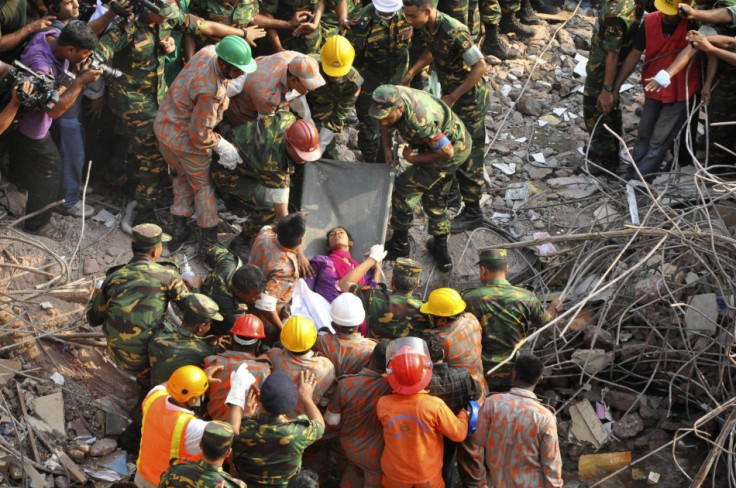Rana Plaza Disaster: M&S, Tesco, Benetton and Other Retailers Sign Safety Pact for Bangladesh Factories

A raft of 70 retailers has signed a legally binding pact to conduct safety inspections at factories in Bangladesh after the Rana Plaza disaster pressurised companies to improve standards.
Retail giants, including the biggest buyer of Bangladeshi-made clothes Sweden's H&M and Benetton, have agreed to provide details of the factories they source goods from, which will be inspected within the next nine months.
Other retailers in the group that signed the pact include Inditex, Metro, Carrefour, Marks and Spencer, Tesco, Esprit and Abercrombie & Fitch. Switzerland-based trade unions IndustriALL and UNI Global Union, which coordinated the agreement, also pledged allegiance to the deal.
The agreement requires retailers to meet minimum fire and safety standards at the factories and to also stump up the costs for upgrading these measures.
"This historic, legally binding accord will affect tangible change on the ground and help make the Bangladeshi garment industry safe and sustainable," said Jyrki Raina, general secretary of IndustriALLin a statement.
Raina added that the factory fires and building collapses in Bangladesh, which resulted in the death of 1,800 workers over the past few years, indicated that voluntary efforts to improve safety had been proven to be "insufficient."
"A profound change is possible only with a strong coalition between trade unions, international brands and retailers, Bangladeshi authorities and employers, and with worker involvement in the workplace with guaranteed freedom of association," added Raina.
UNI Global Union general secretary Philip Jennings noted that the new rules will help "identify the best people and put together the team in Bangladesh" who will be charged with carrying out the task.
The legally-binding pact was announced earlier this year after the collapse of eight-storey Rana Plaza building in Bangladesh on 24 April killed more than 1,100 people. Retailers had until 8 July to agree on a deal.
The incident has resulted in Bangladesh's garment export industry, which is the second-largest in the world after China, receiving global attention for its safety standards.
Last month, the US suspended trade privileges to Bangladesh, following a year-long review of labour practices and safety standards in the country.
Furthermore, British retailer Tesco said in June that it has stopped sourcing clothes from a Bangladesh site because of safety concerns.
Meanwhile, although leading European retailers have supported the pact, American retail giants such as Walmart and Gap have refused to sign the accord and have instead opted for self-regulation.
© Copyright IBTimes 2024. All rights reserved.






